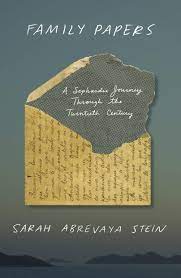In the last four weeks I enthousiasticaly and passionately read a book with the title “Family Papers, written by Sarah Abrevaya Stein. Mainly based on epistolic dialogues between members of four generations of a Salonical Shephardic family, it manages to depict in a really enjoyable and vivid way the historical route of a family confronted by the deep political and financial changes that signified the transformation of empires into a world of nations. While reading it I learned critical details of the historical presence of the Jews in Greece. I was really impressed to get to know that Salonica was officially renamed to Thessaloniki not earlier than 1936 and that in the same year the most prominent member of the family enriched the Salonican list of candidates for the Greek parliament of the right-wing Freethinkers’ party of General Ioannis Metaxas. Unfortunately, a few years later the Greek authorities “fruitfully cooperated” with the occupying authorities to erase Europe’s largest Jewish burial ground, i.e. the Sephardic cemetery of Salonica, and used sacred stones to build new walkways as well as the Aristotle University of Thessaloniki! This was just a single act of destruction of the signs of Sephardic historical presence in a chain of long-lasting efforts to break the continuity of a multinational society in a strategic Balkan port and city.
I really recommend the book of Dr. Stein as a key reading to those who are interested in the history of people/communities of one of the most historical cities in the Balkan peninsula. The book may also embody a source of interpretations for the dominance for many years prior the outburst of the financial crisis in 2009 of local political powers that systematically fostered an exclusive, fortress mentality.
fortress mentality.
“Four generations, a century, and a distance of some seven thousand miles seperated the Sa’adi with whom this book began and the Sadi with whom it ends. These Levys were connected not only by blood and name, but also by their Judaism and their Sephardic culture, and by their committment to tradition. They were also connected by the most fragile of materials-paper… The simple act of letter writing [was] used to bind the branches of the extended Levy family, grafting connections that would not otherwise have been made. [For most of them] the past continued to matter. The women and men in the extended Levy family were fiercely independent creatures of their eras, but they were also descendants”.
